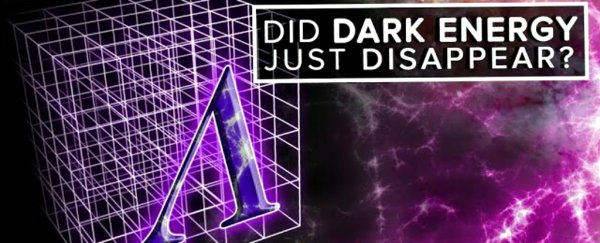
You might have read the headlines a few weeks ago about a controversial study that found evidence that the Universe might not actually be expanding at an accelerating rate.
The paper was big news for the scientific community. Not only are our future projections about the Universe based on the idea that it's expanding faster and faster, but so is the entire concept of dark energy - the hypothetical force that scientists think is pushing the Universe apart faster than gravity can pull it back in.
In other words, if the Universe isn't actually expanding at an accelerating rate, did dark energy just disappear?
It's a pretty big question, and luckily for us, PBS Space Time is here with a new episode to do a deep dive on the research and break down exactly what we do and don't know about dark energy, and what this new paper means for the future of the Universe.
So, let's start at the beginning. The concept of dark energy was first proposed in 1998, by two independent teams of astronomers who had been studying the expansion of the Universe by watching the explosions of type 1A supernovae.
Everyone had expected the expansion of the Universe to be slowing down due to the effects of gravity, but the two teams both found evidence that the expansion rate has actually been accelerating for half of the age of the Universe.
To explain this, the researchers decided that there must be something acting counter to gravity, which we've now come to know as dark energy.
The finding led to a shared Nobel Prize in 2011, and since then, dark energy had become a cornerstone of our understanding of the Universe.
That is, until this latest paper questioned those foundations. The researchers behind it studied a whole lot more type 1A supernovae explosions since 1998 - they've now studied 740 of them, compared to just 10 back then.
And, as was widely reported, their data indicates that there might be no dark energy at all, and no accelerated expansion - their results suggest that the Universe is expanding at a constant rate, but it's not speeding up or slowing down.
So now that we've got this new paper with a whole lot more sample sizes, should we just throw out 20 years of work on dark energy and go back to the drawing board?
As the episode above explains, nope. Definitely not. Because, if you do a little digging, you'll find that what was mostly covered in the media about the new paper was only part of the story. The new study can actually agree with the old dark energy results, depending on how you look at it.
In fact, as scientists have pointed out since then, if you look closer, the existence of dark energy still fits the new data the best. All the study really shows is that the new observations are also consistent with a wider range of possible expansion histories.
To understand what that means, and why you don't need to chuck out your textbooks just yet, check out the video above, which takes you through exactly how scientists analyse astronomical data like this.
It also explains why we need to take into account so much more than just type 1A supernovae data in order to figure out what our Universe is doing - for example, the fact that the Universe is flat (not Earth, though).
It's a deep dive, but it's an incredible summary of what these important results mean in the context of astronomy, and it's definitely worth the 15 minutes.
